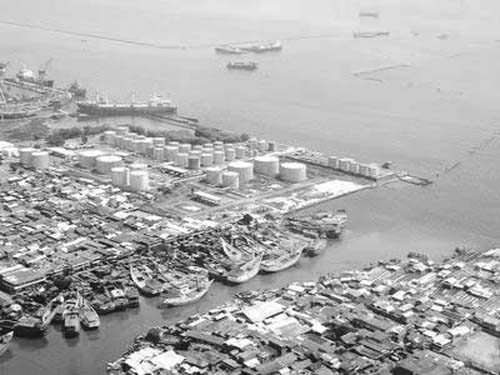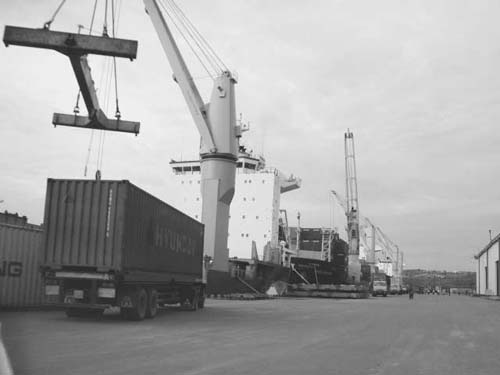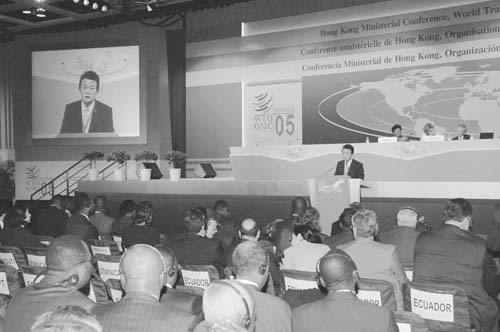Japan's Official Development Assistance White Paper 2006
Main Text > Part II ODA DISBURSEMENTS IN FISCAL YEAR 2005 > Chapter 2 Details about Japan's ODA > Section 2. Measures for Each of the Priority Issues > 2. Sustainable Growth > (5) Facilitating Trade and Investment
(5) Facilitating Trade and Investment
Because one key to sustainable economic growth is the private sector taking on a leading role, it is important to promote and stimulate the activities of the private sector, including trade and investment. However, there are a vast number of policy measures that the governments of developing countries must carry out in order to develop investment climate to attract the private sector. For many poor countries it is difficult to resolve this issue by themselves. Therefore, assistance from donor countries or based on various international frameworks is necessary. From this perspective, Japan has been providing assistance in the areas such as infrastructure development, institution building, and human resource development though ODA, Other Official Flows (OOFs), and others.
For example, in Indonesia, Japan provided a yen loan in FY2003 to rehabilitate the Tanjung Priok Port, the largest port in the West Java area. Furthermore, to improve the access to the port, Japan again provided yen loans consecutively in FY2004 and FY2005 for the Tanjung Priok Access Road Construction Project. For the local economy the port serves as an international gateway for the raw materials and products it needs. Therefore this project is expected to contribute to improving the distribution infrastructure of the area and further vitalizing Indonesia's economy.

Port of Tanjung Priok (Photo: JBIC)
Furthermore, in March 2006 Japan decided to provide a yen loan to the consulting services for the Sihanoukville Port SEZ Development Project in Cambodia. As this port is Cambodia's only international port, this project is aimed at establishing the area adjacent to the Port of Sihanoukville as a special economic zone (SEZ). The establishment of SEZ, following the renovation and expansion projects of the same port implemented by Japan, would help promote the introduction of foreign direct investment into Cambodia and expand its trade. The series of these projects is expected to help vitalize the activities of Cambodia's private sector and achieve sustainable economic growth.

Port of Sihanoukville (Photo: JBIC)
Along with direct investment from overseas, trade has great importance to the development of developing countries. The World Trade Organization (WTO) is an international organization that works to maintain and strengthen the multilateral trade system. The Doha round of the WTO negotiations focuses on economic growth and poverty reduction through trade by developing countries as its core theme. As of November 2006, the WTO consisted of 149 member countries, about three quarters of which are developing countries. Among those developing countries, 32 are Least Developed Countries (LDCs). Consequently, economic conditions vary greatly among WTO member countries in terms of trade volume and gross national income (GNI). Therefore, various adjustments need to be made in order to establish trade under a common set of rules—the WTO agreements. To this end, WTO has formulated a technical cooperation plan to enhance the capacity of developing countries to execute the WTO agreements and participate in negotiations, and has been holding regional seminars and dispatching experts concerning various areas of the WTO. Since the launch of the Doha Round in 2001, Japan has extended approximately ¥380 million to the Doha Development Agenda (DDA) Global Trust Fund, which was set up to help implement the technical assistance plan. In addition, as for bilateral assistance, Japan implements approximately 1,200 Trade Related Technical Assistance/Capacity Development (TRTA/CD) projects annually, including these related to WTO agreements.
During the current Round, the WTO held ministerial conferences in Cancun, Mexico in September 2003 and Hong Kong in December 2005, neither of which succeeded in reaching agreement. Targeting the end of 2006 for concluding the current round of negotiations, efforts continued among the WTO members. However, negotiations were suspended as a result of the G6 Ministerial Meeting in Geneva of July 2006.
Japan has been constantly calling for poverty reduction in developing countries through economic growth. Seeing trade as a significant factor to help the economic growth of developing countries, Japan has also been emphasizing the importance of assisting these countries through the promotion of trade. In light of this, the suspension of the current Round of WTO negotiations in July 2006 is considered to have significant impacts on LDCs and other developing countries, as well as to Japan, which has been seeking to develop and which has regarded the multilateral trade system as the foundation of its trade policy, and which has been actively contributing to an early conclusion of the current Round in order to further develop and strengthen the multilateral trade system.
Currently, discussions on "Aid for Trade" are actively held at various international forums. As part of this movement, Japan presented its New Development Initiative for Trade prior to the Hong Kong Ministerial Conference of the WTO in December 2005. This Initiative is made of a comprehensive package of assistance and measures designed to promote trade and thus contribute to the development of developing countries. The package covers each area of trade—"Produce," "Sell," and "Buy." The package thereby provides comprehensive and tailored assistance by combining various programs through ODA and other relevant measures such as the provision of Duty-Free, and Quota-Free market access for LDC products (see Box I-1 for details on the Development Initiative for Trade). Through this Development Initiative for Trade and other means, Japan intends to continue its commitment to promoting the trade of developing countries, regardless of the suspension of the Round of the WTO.

Hong Kong Ministerial Conference of the WTO
In order for developing countries to improve their market access, the importance of improving their export capacity and competitiveness has been stressed on an international basis, especially through the Generalized System of Preferences (GSP) which adopts lower tariff rates than general rates for their exports. Improving market access for LDCs through duty-free and quota-free treatment in particular has been an agenda not only in the trade negotiations in the WTO, but also in the arena of the UN, such as the MDGs and the Programme of Action for the Least Developed Countries for the Decade 2001-2010.
Based on the agreement at the United Nations Conference on Trade and Development (UNCTAD) in 1970, Japan has been working toward the improvement of GSP scheme since 1971. In the efforts put forth after the launch of the DDA, since April 2003 the number of items imported from developing countries other than LDCs and eligible for preferential treatment has been increased by about 120. For the LDCs, approximately 200 agricultural and fishery products have been added for duty-free and quota-free treatment. As a result, roughly 93% of imports from the LDCs enjoy duty-free and quota-free treatment in terms of value. When focusing particularly on the African LDCs, which account for more than 60% of the 50 LDCs in the world, approximately 99%19 of their entire exports to Japan are duty-free and quota-free in terms of value. Japan has thus contributed to ensuring market access by these countries. Looking ahead, Japan intends to further assist the improvement of market access for LDCs, by keeping promises regarding duty-free and quota-free treatment for the LDCs products announced in Japan's New Development Initiative for Trade
Moreover, the Economic Partnership Agreements (EPAs) that are being actively advanced by Japan in recent years have great significance in liberalizing trade and investment and harmonizing the economic system, thus facilitating the flow of people, goods, money, and information beyond borders and contributing to the growth of all relevant countries. Therefore, the Medium-Term Policy on ODA states Japan's intention to strategically provide ODA in order to make the impact of EPAs even larger by supporting the development of trade and investment environments and the economic infrastructure of related countries and regions, including the East Asian region with which Japan has been developing EPAs (see Part I, Chapter 2, Section 2 for details).
Specifically, Japan has been providing assistance in developing human resources and institutions related to trade and investment, assistance in establishing domestic legal systems related to areas such as the protection of intellectual properties and competition policies, assistance in improving enforcement and enhancing capacities in the area of customs and immigration control, and assistance in areas such as ICT, science and technology, small and medium-sized enterprises (SMEs), energy, agriculture, tourism, and the environment. As such, Japan has been advancing cooperation in various areas.
Through bilateral assistance and cooperation with international organizations, Japan will continue to maintain coherence in ODA and trade policies, and actively advance cooperation toward poverty reduction and sustainable growth by promoting the participation of developing countries in the multilateral trade system and enhancing economic partnerships based on a comprehensive viewpoint of trade and development.


 Next Page
Next Page